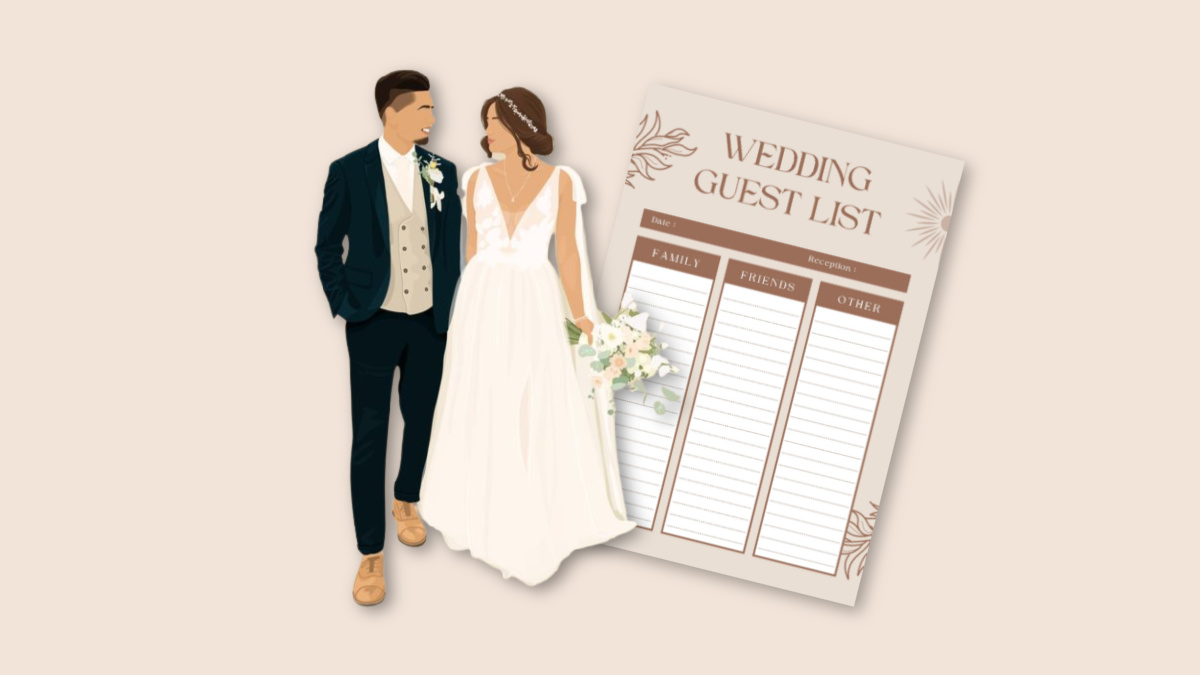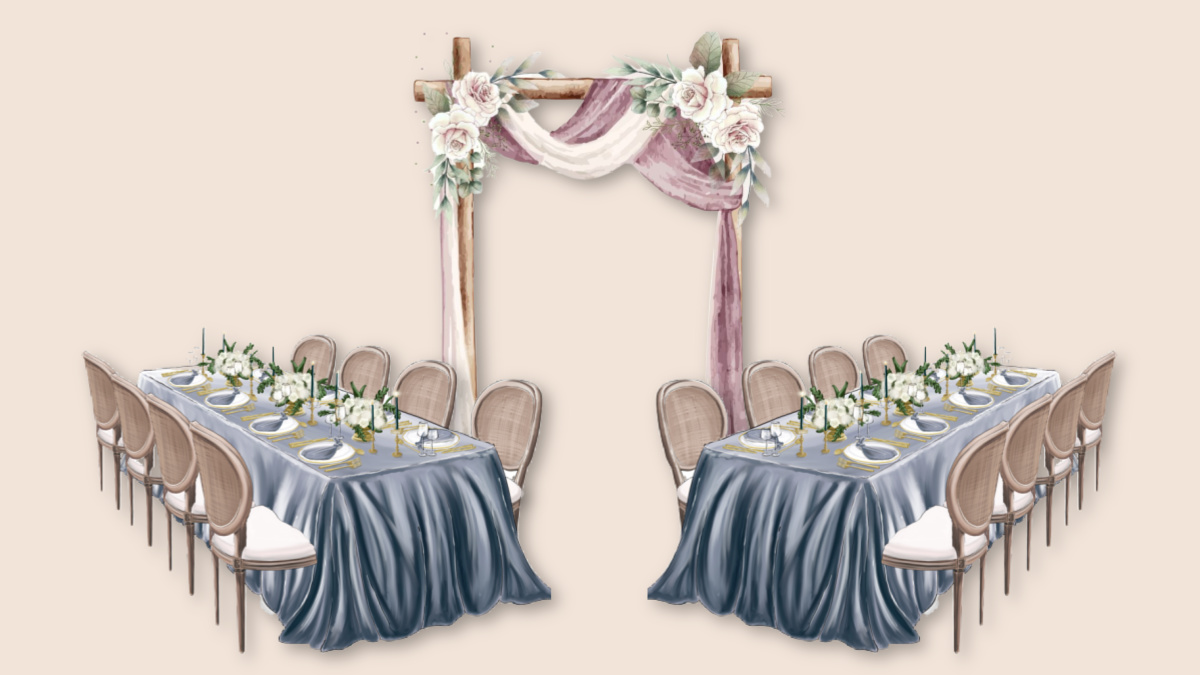What’s the best size for a wedding?
Weddings with more than 150 are “large size” weddings, and anything between 75 and 150 to be an “average” wedding. Weddings with less than 75 guests can be broken down into 3 main categories:
- Micro wedding: Less than 20 guests.
- Small wedding: Between 20 and 50 guests. This is often a number that can fit in an average-size backyard.
- Intimate wedding: 50 to 75 people.
So, who should I invite to my wedding? The number of guests you should invite to your wedding depends on various factors including your budget, the location, and the atmosphere.
Generally speaking, it’s best practice to share the guest list with your partner. For instance, if you wish to send out 100 invites to guests for your wedding, you and your partner should get 50 invites each.
One of the most important aspects of your day is the size of your wedding. While it may seem unimportant or minor, the guest list affects the entire event, including your future interactions with the guests you invite (and don’t invite).
Sitting down to focus on your guest list can be a daunting task. Third cousins you last saw at family gatherings years ago and a list of your parents’ friends that you’ve never met suddenly appear out of the blue as what began as family or friendship snowballs into third cousins. Here is a comprehensive guide to help you decide the number of guests you should stick to.

How Many People Should I Invite to My Wedding?
One of the most difficult aspects of wedding planning is trimming the guest list. Choosing which elements are most important to you should come first. This will directly affect the number of visitors you invite.
What matters most to you and your spouse on the big day? Is it the cost, the setting, or the mood?
Planning your budget involves more than just establishing a list of the people you want to celebrate with. Depending on the capacity of your venue, you may have to invite your weird cousins skip those great new friends you really want to invite, and leave out others entirely.
I’ve created wedding guest list etiquette, questions you should ask yourself, and professional guidance on who should get that coveted invite to help you decide who to invite to your wedding.
Create a Preliminary List With Your Partner
Start making a guest list with your partner before involving your relatives. Start with your immediate families, and then invite the other members of your immediate family you really want to be there.
Remember, The number of people who attend your wedding will depend on a variety of things. Location is one of the most important elements. You can anticipate a higher number of declines if your wedding is at a destination or if the majority of your guests will need to travel.
Your closest friends—the people you simply cannot imagine getting married without—should come next.
This list definitely won’t include everyone you want to invite, but it’s a nice place to start and should include the things your parents will want to see. The technology needed to complete the RSVP process in the modern age of online wedding RSVP can be a challenge for many guests.
Consider contacting or following up with any relatives known to be particularly tech-challenged to ensure they can respond accordingly and promptly.
In addition, they would undoubtedly be delighted to hear from you and chat endlessly about the wedding nonetheless!
But hold off on involving your families just yet; you need to work out this initial issue first to ensure that everyone is fairly represented later on.
The political component comes next. Maintaining balance is often the wisest course of action. When it comes to sending wedding invites, either everyone’s aunts as well as uncles are invited, or nobody is.
Of course, you’re free to do what you like. However, if someone is offended for being left off the guest list, it is essential to be truthful but kind in your response.
Talk About the Dreaded Wedding Budget
You’ve imagined every possible ideal scenario at this point, but reality has to bite. You and your spouse now need to have an open discussion about how much you want to spend on your wedding, taking into account any potential family contributions mentioned above.
Once you and your partner have discussed your wedding objectives, figure out how much money each of you can realistically and comfortably contribute. Nowadays, the cost of a wedding is becoming a shared expense, so talk about how much you’re both willing to spend.
The average cost of a wedding guest when you take into account food, drinks, rentals, wedding invitations, etc. can range from $200 to $500+ and averages $300 in the U.S.
Although the amount of people you invite will have a direct impact on your overall budget, you don’t have to invite everyone on your list if you don’t want to.
So, how do you go about creating your wedding budget?
- How much do you want to spend? This is the first and most crucial step. Before you make any judgments, you must have a firm understanding idea of your wedding budget.
- Compile a list of every expense related to weddings. This covers elements like the food, decorations, venues, music, among others.
- Determine the most important expenses. This helps you set spending priorities and ensures that you get the best value for your money.
- Make decisions based on your wedding budget. Now that you know what you can afford, you can make more informed spending decisions.
- Be open and honest with wedding professionals about your financial situation. This prevents heartache and stress in the long run.
Remember, with 80 guests instead of 160, a $30,000 wedding budget will look very different and provide you more options for your location, food, and even your choice of vendors.
Set a Date for When You’ll Stop Sending Family Invitations
Sending invites to extended family can be tricky. Who even knows the distinction between first and second cousins?
As a general rule, if one uncle is invited, then all of your aunts and uncles must also be invited, and the same holds true for first or second cousins. For smaller families, this isn’t much of a problem, but for huge extended families, this can account for the majority of your guest list.
Give the Same Number of Additional Guests to Both Families
Once your families have been invited, calculate the number of open slots you still have and split it equally among the two of your families.
This means that both parties should be given approximately the same number of guest invite slots—about a third of the total number of guests each—if everyone is contributing equally, or if you and your future spouse are paying the entire wedding bill.
The couple should then get roughly half of the invitations, and the bride’s and groom’s families should get a quarter of the invites each.
For instance, if you are planning to have 200 guests at your wedding, the groom and bride should choose around 100 guests, and their parents should get 50 invites between them.
Give your parents free reign to use these seats however they see fit while making it plain that no further seats are available. Ask parents from both sides for their ideal guest invites before discussing it as a couple.
One set of parents may have 50 people, but the other may only feel strongly about inviting 35. Send out the invitations if that works for your budget. It shouldn’t come down to a power struggle.
Your mother-in-law can invite her best friend in this fashion, and your father-in-law can invite his business partners (the same people who invited him to their son’s wedding last year, in case you’re wondering).
What About Children?
Whether or not children are invited to the wedding is totally up to the couple. Put your foot down after deciding whether you want children present or would rather an adult-only gathering. There are no exceptions, unless you want things to get messy in a hurry.
Invite the Newlyweds Whose Weddings You Attended
This one is difficult. Even though you were a bridesmaid, you’re not required to invite a friend to your wedding if she invited you to attend hers five years ago.
Therefore, you can take someone off your guest list if you are unsure about inviting them. Your guest list should only include people with whom you currently have close relationships, not guests you simply feel compelled to invite.
However, you should make an effort to include that couple on your guest list if you attended a wedding in the previous 18 months (especially if you or your partner were at the wedding party).
Finalize the Guest List
The fun starts once your venue is reserved and your guest list is complete. Make your wedding website first, and then start gathering attendee addresses from there. Using an address collection tool is among the simplest ways to accomplish this.
Once you’ve gathered all the necessary addresses, save them in your address book so you may use them for future wedding-related occasions like holiday cards.
What’s the Average Percentage of Invites Accepted?
On average, 83% of invited guests attend weddings of our users, while 17% of guests decline the invitation. In other words, if your guest list is 100 people, you may anticipate 83 attendees showing up on your special day and 17 guests declining.
Here are some suggestions to help you increase the number of positive RSVPs and change the RSVP ratio for your own event. While these tips should help in most cases, they don’t guarantee higher responses to your event. Keep in mind that there are many elements that can improve the percentage of positive RSVPs you can expect to receive (well, if you want to, of course).
- Send invitations out early to give your guests ample time to plan and prepare for your day.
- Consider your RSVP wording so your guests understand why you need these responses back and when you need them.
- Create a guest list that will help you avoid problems.
- Think in advance of those who might have trouble responding. Think in advance of those who might have trouble responding.
How many people should I invite to my wedding if I want 150 to show up?
Research shows that 80 to 85% of wedding invites are honored. Therefore, you should send around 190 invites.

5 Most Common Wedding Attendance Sizes
Elopement (0-5 People)
An elopement is typically defined as a couple leaving together in secret to get married. These days, you’ll frequently notify your close friends and family members, and you might even invite a few loved ones to be witnesses.
An elopement might be for you if you like the concept of traveling (typically locally or abroad) for a wedding that is just the two of you or has a very limited number of guests (typically 0 to 5).
Your elopement can be followed by a bigger event when you come home.
Common Ideas include a destination wedding, a cozy cottage or charming summerhouse, a treehouse, a lakeside or beach event, and a charming registry office.
What’s the Cost?
Although there is no set cost of eloping, most couples tend to spend between $5,000 and $15,000, which is far less than the $33,000 national average for a traditional wedding.
Couples who are eloping typically spend less money and less time on the things they don’t care about. Determining what is essential to you on the day of your elopement will therefore be crucial.
The average cost of a traditional wedding in the United States is about three times more than the cost of eloping. This is typically due to venue costs and more catering than elopement or even a small outdoor wedding.
Intimate (5-20 People)
Intimate weddings are all about the connections and feels. Microweddings provide for meaningful moments where the couple can spend quality time while engaging in real conversations with the people you cherish most in the world.
These little weddings have a unique vibe that creates magical moments. An intimate wedding is more than simply the total number of guests; it’s also about the personality of the couple and how they interact with their guests
You have a little more room to enjoy special entertainment like live painters, cigar rollers or fire dancers as well as multi-course meals with wine pairings.
These experiences don’t necessarily have to be strictly to the big day either. You can organize group activities prior to the wedding if your guests will be staying in town for a few days in order to introduce some of the guests who have never met. Remember, It’s all about making magical lasting memories.
Any wedding with less than 75 guests qualifies as intimate. After all, good things usually come in small packages.
Why Should I Have an Intimate Wedding?
Celebrate your union with those that matter most to you. The dreadful guest list is loathed by everyone! Only invite the people you really want to be there to. You’ll feel at ease and be able to enjoy your special day if you are surrounded by the people you love and who know you best.
One of the main complaints that newlyweds have is that they don’t get to spend enough time with each of their guests.
An intimate wedding eliminates the need or pressure to move on to the next visitor. As a result, you can be more genuine and make everyone feel appreciated.
An intimate wedding is the ideal alternative to having to invite distant relatives you had no idea you had!
You can have a celebration with close friends and family at an intimate wedding without having to put on a show. It always comes down to the individuals, and good company goes a long way.
So free yourself from the social obligation or guilt and spend time welcoming your visitors in a private setting where they will also find mingling in smaller gatherings enjoyable.
What’s the Cost?
An intimate wedding typically costs around $8,550, based on a guest list of 50 people. This can be done while saving money that would otherwise be spent on a bigger wedding. The location of the wedding and the elements involved will also affect the cost.
Small (20-50 People)
Small weddings are intimate events that include the couple’s closest friends and family. Typically, there will be between 20 and 50 guests or less present. Keep in mind that small weddings are not always inexpensive.
However, they are highly personalized and are relative to culture and various family sizes.
Smaller weddings also give planners more control over the event’s overall aesthetic, including how the guests are welcomed. Nowadays, couples are creating Lovely wedding themes and color schemes décor and attire.
We are gradually switching from traditional wedding décor and now guests are actively involved in various elements of wedding planning, such as choosing the color palette.
The wedding decor may also include the guests’ attire, which is the true definition of a special, unique wedding mean. The wedding day is an important element of a “photoshoot,” planners work together with guests to ensure coordination of color schemes and style with the guests.
What’s the Cost?
A small wedding’s typical average cost might vary widely depending on a variety of factors. Small weddings typically cost anywhere between $10,000 and $28,000, but the total cost varies depending on the location, the menu, the decorations, and other factors.
When planning your wedding, you should carefully consider your budget and be sure to get exact costs based on your individual preferences and needs.
Other factors that should be taken into consideration include:
- Food/catering
- Bar Service
- Make-Up and Hair
- Music
- Invitations
- Photography
- Flowers and Decor
Medium (50-100 People)
A medium-sized wedding will have between 50 and 100 guests. Although this is a very wide range, most weddings in the US find themselves in this category.
The typical number of day guests at medium weddings has stayed around the 80 to 85 mark over the years, and you’ll find that planners, venues, caterers, and other service providers use that range as their baseline. Most couples will be able to invite all of their friends and plus ones, as well as direct and extended relatives, with a guest count of 50 to 100.
What’s the Cost?
The average cost of a medium wedding has significantly changed in recent years. Couples spent $28,000 on average in 2019; however, this figure fell dramatically in 2020.
Even though wedding costs have been declining recently, the pandemic reduced the average cost of a medium wedding in 2020 to $19,000, with a reduced number of guests and a general change in how weddings were conducted.
Spending categories that should be taken into consideration while planning an average wedding include:
- Wedding and reception venue
- Rehearsal dinner
- Officiant
- Tuxedos
- Dress
- Photographer and videographer
- Invitations
- Rings
- Wedding planner
- Cake
- Catering
- Flowers
- Reception band/DJ
- Wedding day transportation
Some of these expenses are necessary, but not all of them. You’ll definitely need an officiant, but you might not need to spend $2,000 on flowers or a full $1,500 on a wedding planner.
Choosing more reasonably priced wedding locations and handling some of the planning yourself may be effective ways to reduce your wedding expenses.
Large (100+ People)
If you dream of an extravagant big wedding with all of your loved ones there, then a large wedding is ideal for you.A large wedding is instant partying! Before you go down the aisle, there will be excitement, and you’ll have enough people to keep your dance floor packed all night.
You’ll feel surrounded by genuine happiness and love in the celebratory atmosphere that comes inviting everyone.
A big wedding gives you the chance to honor not only your relationship as a couple but also the people who have influenced your life. You can’t picture saying “I do” without any of these people at your side, whether it’s your sorority sisters, your second-grade teacher, or the boss who gave you your first job.
While many couples (and their families) dream of having the party of the year, it can obviously be quite expensive. Larger weddings require more time and money for planning. If you’re planning a large event, make sure to reserve your venue early enough in advance because venues that can comfortably hold more than 1050 guests are very few.
Consider a longer engagement period or choosing reputable vendors that will ensure that you realize your grand vision because a larger wedding demands more planning.
What’s the Cost?
Obviously, larger weddings are more expensive than smaller ones. Start by looking at your guest list as one strategy. The amount of direct relatives and close friends on your guest list may be a very important factor if you and your future spouse come from large families.
There is a maximum number of guests that a venue can comfortably hold. In most places only a few local locations can hold events with more than 200 guests. You might not be able to invite every individual you know to your idyllic garden wedding on a big old farm. A larger guest list might, however, be accommodated at a large hotel or modern vineyard.
Conclusion
It’s comforting to believe that you and your intended are the only ones with the authority to decide who is invited.
However, that only applies if you’re paying for the wedding and don’t care what other people think. If your parents or other family members are financially supporting you, they probably have their own preferences for the guests you should invite.
Don’t take everything too seriously. Although it’s important that everything goes smoothly, keep in mind that there may be bumps along the way and you may need to adjust some of the details along the way.
Keep in mind that if your parents or other family members are supporting you financially, they probably have their own preferences for the guests you should invite.
The political component comes next. Will the aunts and uncles from your mom’s side of the family be envious if you bring relatives from your dad’s side? Maintaining balance is often the wisest course of action.
Either everyone’s aunts as well as uncles are invited, or nobody is. Of course, you’re free to do what you like. If someone is offended for being left of the guest list, be truthful but kind in your response.
FAQs
How many guests should I extend an invitation to?
There is no perfect number of guests to aim for; guest lists are a question of personal preference and financial limitations. A huge wedding often has more than 150 people, whereas smaller, more intimate weddings have 50 or fewer.
How do I let someone know they’re not invited to my wedding?
This heavily relies dependent on how you feel about that person. The difficult situation can be eased by kindly explaining the restrictions of your guest list or wedding size and stating how much you would have liked their presence. Offer to celebrate instead over dinner or drinks if it feels natural.
Who receives an invitation to a bridal shower?
The bridal party, as well as close friends and family, should be invited to the bridal shower. Anyone who was not invited to the wedding should not attend this considerably smaller event.
Who is invited to the rehearsal dinner?
Those taking part in the wedding ceremony are typically the only ones invited to the rehearsal dinner. There are also members of the bridal party and close family. It is not necessary to invite out-of-town guests, but it might be a wonderful gesture of thanks for them making the extra effort to attend the wedding.







